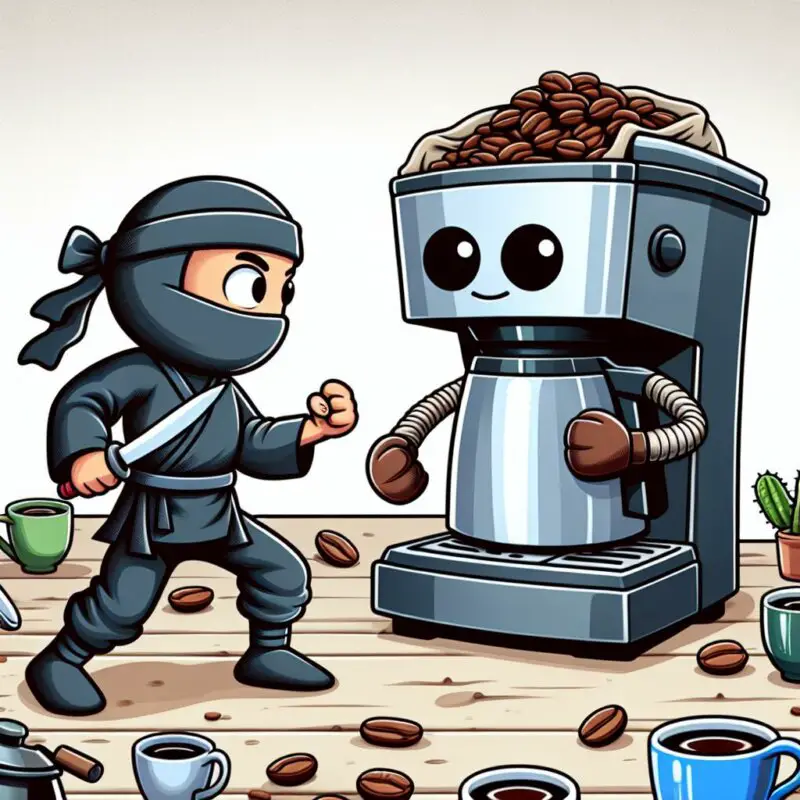This post may contain affiliate links. Please read my disclosure for more info.
Did you know there’s a fine line between burnt and bitter coffee? It’s easy to mix them up, but understanding the difference is key. This knowledge helps you fix a bad cup of coffee the right way. Let’s dive into how to tell them apart and make every sip of your coffee enjoyable!
Ever wondered why your coffee has a burnt taste? You’re not the only one. This can happen for several reasons, but one common cause is using coffee beans that are already burnt.
Discovering why your coffee tastes burnt is the first step to making it delicious again. Let’s explore the reasons behind that burnt flavor and how to fix it. Keep reading to learn more!
What Does Burnt Coffee Taste Like?
Before diving into why your coffee might taste burnt, it’s key to recognize what that means. Imagine sipping on something that reminds you of ashy bitterness and the charred edges of burnt toast. This off-putting flavor stems from complex chemical changes happening as coffee beans roast.
Understanding how to tell a burnt coffee flavor from other off tastes is key. Mastering this can enhance your coffee experience. Learn to identify these distinct flavors and enjoy better brews!
Bitter
Did you know that burnt and bitter coffee often taste quite similar? It’s common for many of us to mix them up. Usually, the culprits behind these unpleasant flavors are using water that’s too hot or brewing with beans that aren’t fresh.
Burnt
Recognizing burnt coffee is key for any coffee lover. It has a distinct taste – similar to burnt toast. Once you experience it, you’ll know right away. Imagine sipping a coffee that reminds you of that charred flavor.
Burnt coffee often has unusual dark spots and can really turn you off from enjoying coffee.
Metallic or Plastic-like
Ever noticed a weird, metallic taste in your coffee? Often, it’s because of your coffee maker or the water you’re using. Dirty machines or tap water full of impurities can leave your brew tasting more like metal than mocha. And if your coffee tastes like plastic, it’s likely for the same reasons.
Make sure to clean your coffee maker well and use fresh, clean water for the best taste!
Why Does My Coffee Taste Burnt?
There are several reasons why your coffee might end up tasting burnt. Understanding these reasons can help you steer clear of that awful burnt flavor, making your coffee experience much more enjoyable.
Coffee beans go through a lot to give us that delicious cup of coffee. But, it only takes one slip-up to make it taste burnt. Let’s explore five common mistakes that can ruin the taste of your coffee.
1. Water that’s too hot
Did you know using water that’s too hot can ruin your coffee? Yes, it’s true! If your water is too hot, it can make your coffee taste burnt. This happens because of something called over-extraction. So, when making your coffee, remember to watch the temperature of your water to keep your brew tasting great!
To make your coffee taste its best, it’s crucial to use water at the right temperature. Experts from the National Coffee Association of the USA suggest heating your water between 195 °F and 205 °F. While many drip coffee makers don’t offer temperature control, automatic pour-over machines give you that flexibility, elevating your coffee experience.
2. Incorrect water to coffee ratio
Drinking coffee that tastes burnt or too bitter? The problem might be too much coffee in your water. Learning the perfect coffee to water ratio is an easy fix for a better cup. Give it a try!
Experts suggest a coffee to water ratio between 10:1 and 18:1. For perfect brewing, begin with a quality coffee scale to measure accurately.
3. Burnt coffee beans
If your coffee tastes burnt, it’s likely because of your beans. Properly roasted beans should look even in shape and color. If they don’t, they might not brew well, leaving you with a less-than-ideal cup. This is a simple way to check if your coffee beans might be the problem.
- If they’re partially green, it means that they’re underdeveloped.
- When they appear too dark and oily, they’ve been overdeveloped.
- You might see a mixture of scorched and normal-looking beans.
- There could be burn marks that appear on the thin edges of your beans.
- If they taste malty, it’s because they’ve been baked instead of properly roasted.
Roasting coffee is an art, and mistakes can change the taste. Sometimes, you might miss out on those wonderful, rich aromas. Other times, you could end up with a burnt, bitter taste that’s far from enjoyable. Let’s explore how to avoid that!
If you’re not roasting beans yourself, buying from an expert is key. Elevate your coffee game by choosing higher-quality beans. Plus, mastering how to store coffee beans is crucial to keep them fresh and flavorful.
Dark roasted coffee beans have a bold taste that many love. To enjoy this rich flavor, choose high-quality espresso beans. Avoid the low-quality options often found in grocery stores.
4. Overly fine grind size
Grinding beans too fine might make your coffee too bitter. Pick the right grind size for a perfect cup!
5. Dirty brewing equipment
It’s surprising how many people forget to clean their coffee makers or don’t do it right. Leftover residue in your machine can ruin the taste of your fresh coffee, making it taste burnt.
After enjoying your coffee, remember to clean up. Plus, give your coffee maker a good descaling every month to ensure your brew stays fresh and delicious.
How to Prevent Coffee that Tastes Burnt
Sipping on a cup of coffee that tastes burnt is something you might encounter, but it doesn’t have to be a regular ordeal. You can avoid this with a few simple steps. Here’s what you can do to keep your coffee tasting great.
- Consider adjusting the temperature of your machine. Make sure that your water isn’t too hot or cold because it can change the taste of your coffee.
- Opt for high-quality coffee. Using low-quality coffee will likely give you coffee that tastes burnt.
- Choose the right grind for your coffee depending on the type of coffee that you wish to make.
Frequently Asked Questions
Does burnt coffee taste sour?
No, it doesn’t. It has a variety of unpleasant characteristics. You get ashy, bitterness, and burnt toast flavors bundled up into one thing.
Is burnt coffee bad for you?
Slightly burnt coffee is safe, but you should avoid coffee that was badly burnt during the roasting process. When coffee is burnt at a fast speed in high temperatures, it releases high levels of a carcinogenic chemical known as acrylamide.
How do you know if you’ve burnt your coffee?
You’ll likely know that your coffee is burnt through how it smells and how it tastes. If you’re brewing espresso, you’ll notice when it drips slower with less volume from your machine.
What’s Next?
Nobody likes coffee that tastes burnt, just as much as they dislike thin, watery or bitter brews. The good news? You can brew rich, robust coffee without that burnt flavor. Start by finding a new purpose for old beans, investing in a quality grinder, and choosing high-quality beans.
Skip the grocery aisle and dive into the world of high-caffeine coffees for a real kick, luxurious flavored coffees for a taste adventure, or discover unique brews from across the globe. Love a bit of bitterness? Vietnamese robusta beans are perfect, offering a strong flavor without the burnt aftertaste. For an earthy, rich cup reminiscent of Starbucks, try Sumatran beans. And for a silky, smooth sip, Colombian coffees are unbeatable.




